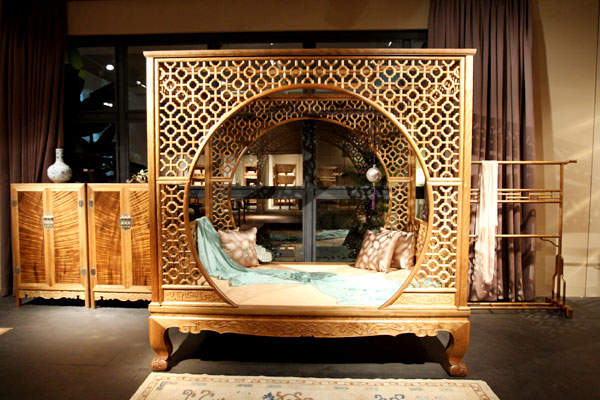
 |
|
A latticed boudoir bed flaunts intricately repetitive flower patterns made using mortise-and-tenon joints. |
As proof, he points to Beijing's Forbidden City, the site of the royal palaces and the seat of power for nearly half a millennium. This is where every pillar and chair is a marvelously constructed wooden wonder that once spoke well of an everlasting and benign rule.
"On another level, the qualities believed embodied in wood are exactly the ones traditional culture valued - a steadfast inner depth and a suave exterior," Mi says.
Mi has just finished consulting for an exhibition of wooden furniture at Beijing's National Museum called Beauty Honored by Time.
More than a hundred pieces were showcased, both ancient and modern, and all were made from a rare slow-growing wood called jinsi nanmu or golden phoenix wood, valued for its amber color, rippling grain and sweet, soothing scent.
It was in the dimly lit, wood-scented exhibition hall that Mi found the perfect examples to illuminate his thoughts.
"The Chinese attitude toward wood can only be fully understood in the context of their age-old furniture-making traditions," says Mi, pointing to a wooden latticed boudoir bed.
The different parts of its intricately repetitive floral patterns were pieced together by the mortise-and-tenon method, a technique deeply rooted in the country's ancient philosophy.
"The mortise (sun, ) and tenon (mao, ) symbolize yin and yang, the dual forces that rule our natural world and give expressions to all its simultaneously contradictory and interdependent phenomena, such as female and male, water and fire, life and death," explains Mi. "We Chinese believe that enduring beauty could only be achieved through embracing this duality."
Iron nails may rust and screws may come loose but a mortise and tenon fuse into each other for all seasons.
If the idea of yin and yang appears a little too abstract for those born and raised outside of Chinese culture, the many details diligently worked into Chinese wooden furniture can paint a more vivid picture for them, sometimes with an unexpected dash of humor.
An example is the trapeze-shaped book cabinet whose double doors would gradually and automatically close after being opened. The name of the cabinet, "a lazybones' cupboard", tells only half of the story.